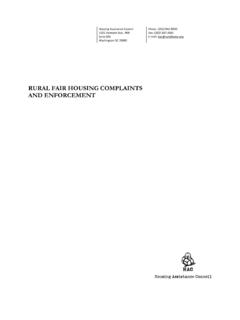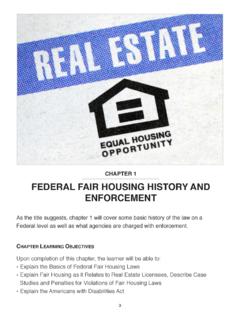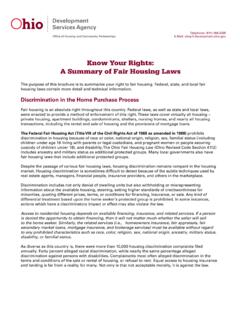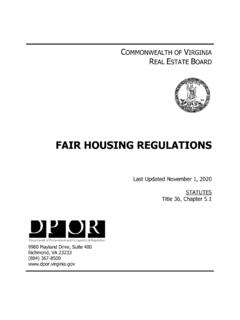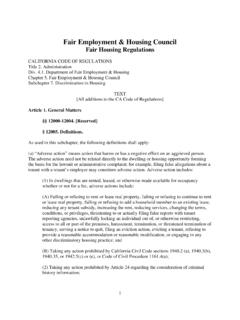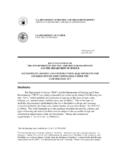Transcription of UNITED STATES DISTRICT COURT FOR THE DISTRICT OF …
1 UNITED STATES DISTRICT COURT FOR THE DISTRICT OF COLUMBIA NATIONAL fair housing ALLIANCE 1101 Vermont Ave NW, Suite 710 Washington, DC 20005, TEXAS LOW INCOME housing INFORMATION SERVICE 1800 W 6th Street Austin, TX 78703, and TEXAS APPLESEED 1609 Shoal Creek, Suite 201 Austin, TX 78701, Plaintiffs, v. BEN CARSON, Secretary of the Department of housing and Urban Development, in his official capacity, 451 7th Street SW, Washington, DC 20410, and DEPARTMENT OF housing AND URBAN DEVELOPMENT, 451 7th Street SW, Washington, DC 20410, Defendants.
2 Civ. Action No. _____ COMPLAINT INTRODUCTION years ago, Congress enacted the fair housing Act, 42 3601, etseq. That Act is best known for barring a variety of forms of housing discrimination. Less attention has been paid to its requirement that the Secretary of the Department of housing 1:18-cv-01076 Case 1:18-cv-01076 Document 1 Filed 05/08/18 Page 1 of 60 2 and Urban Development (HUD) administer the programs and activities relating to housing and urban development in a manner affirmatively to further the policies of that Act.
3 Id. 3608(e)(5). Although this Affirmatively Furthering fair housing (AFFH) requirement was of great importance to Congress in enacting the Act, for decades, HUD inadequately enforced it. The agency has permitted more than 1,200 grantees mostly local and state government entities to collectively accept billions of dollars in federal housing funds annually without requiring them to take meaningful steps to address racial segregation and other fair housing problems that have long plagued their communities. 2. Recognizing that the AFFH requirement had not been adequately enforced, HUD in 2015 promulgated through notice-and-comment rulemaking the AFFH Rule, a regulation requiring covered cities and counties around the country to take meaningful action to address longstanding segregation and otherwise effectuate the fair housing Act s unrealized purposes.
4 The AFFH Rule creates a rigorous process to ensure that recipients of federal housing funds identify local fair housing problems and then commit to taking concrete steps to correct them (under HUD s supervision and with considerable community input), while giving those jurisdictions flexibility to respond to local conditions. At the Rule s core is the requirement that jurisdictions prepare and submit for HUD review an Assessment of fair housing (AFH), a document that includes both the jurisdiction s diagnosis of fair housing impediments and a plan to overcome them.
5 3. In January 2018, HUD abruptly announced that it was suspending for years the requirement that jurisdictions prepare AFHs and submit them for HUD review, effectively suspending the Rule itself. Plaintiffs National fair housing Alliance (NFHA), Texas Low Income housing Information Service (Texas Housers), and Texas Appleseed bring this suit to Case 1:18-cv-01076 Document 1 Filed 05/08/18 Page 2 of 60 3 challenge HUD s suspension of the AFFH Rule s requirements as a violation of the Administrative Procedure Act (APA), 5 500, et seq.
6 4. Before it promulgated the AFFH Rule, HUD engaged in little enforcement of this important provision of the fair housing Act, permitting its grantees to virtually ignore it. Even after a number of federal courts articulated the breadth of HUD s obligations under the AFFH statutory provision, HUD required jurisdictions only to certify that, every few years, they analyzed barriers to fair housing in their communities, made gestures in the direction of solving them, and memorialized this analysis in their own files (never reviewed by HUD).
7 As both HUD and the Government Accountability Office found, putting local jurisdictions on the honor system was ineffective. When pressed, many jurisdictions could not produce any documentation supporting their certifications; others had prepared documents that made no concrete promises or otherwise did not translate into action on the ground to address fair housing concerns. A False Claims Act suit against Westchester County, New York revealed that the County had certified compliance for years without ever assessing whether racial segregation was a problem, let alone committing to addressing the barriers to integration that were well known to exist in Westchester.
8 5. In response to these revelations, in 2009, HUD began an exhaustive, six-year process of crafting a more effective AFFH enforcement regime, culminating in the promulgation of the AFFH Rule in 2015. This Rule requires every covered jurisdiction to develop, submit for HUD review, and implement a planning document called an Assessment of fair housing (AFH) that includes concrete plans to address local fair housing issues. It requires jurisdictions to provide wide notice and solicit public comment about fair housing problems in various communities; to consult with fair housing groups and other interested entities; and to encourage Case 1:18-cv-01076 Document 1 Filed 05/08/18 Page 3 of 60 4 public comment on drafts of their AFHs.
9 Jurisdictions must submit their AFHs for HUD review (along with their responses to comments from the public on those AFHs), and HUD must carefully review them, rejecting those AFHs not meeting specified requirements and requiring the submission of revised, compliant versions. In short, the AFFH Rule requires jurisdictions to take meaningful action to earn their federal housing funds by addressing local fair housing issues, while requiring HUD to monitor their compliance. It includes a schedule on which various jurisdictions are to submit their first AFHs, beginning in 2017 and 2018 for a small number of jurisdictions and then ramping up in 2019, by which time jurisdictions, HUD, and advocates will have gained greater familiarity with the process.
10 6. In the approximately two years since it went into effect, the AFFH Rule already has paid dividends. Many jurisdictions that have gone through the AFH drafting process have committed to concrete reforms that will improve the lives of their most vulnerable residents and create more integrated, inclusive communities. They have, for example, committed to provide help for residents of predominantly African-American neighborhoods who disproportionately face unwarranted evictions; make zoning processes more inclusive for people with disabilities; and create affordable rental units in high-opportunity neighborhoods.


